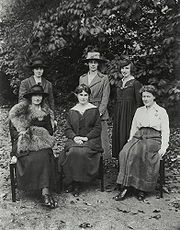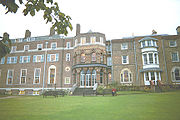
A. E. Levett
Encyclopedia

Bodiam
Bodiam is a small village and civil parish in East Sussex, England, in the valley of the River Rother near to the villages of Sandhurst and Ewhurst Green. It is home to Bodiam Castle, a small range of houses, a pub opposite Bodiam Castle, and a restaurant...
, Sussex
Sussex
Sussex , from the Old English Sūþsēaxe , is an historic county in South East England corresponding roughly in area to the ancient Kingdom of Sussex. It is bounded on the north by Surrey, east by Kent, south by the English Channel, and west by Hampshire, and is divided for local government into West...
, who became a pioneering woman economic historian specializing in medieval feudalism
Feudalism
Feudalism was a set of legal and military customs in medieval Europe that flourished between the 9th and 15th centuries, which, broadly defined, was a system for ordering society around relationships derived from the holding of land in exchange for service or labour.Although derived from the...
. Levett was Vice Principal of St. Hilda's College, Oxford, and later took up an appointment to a history chair at Westfield College
Westfield College
Westfield College was a small college situated in Kidderpore Avenue, Hampstead, London, and was a constituent college of the University of London from 1882 to 1989. The college originally admitted only women as students and became coeducational in 1964. In 1989, Westfield College merged with Queen...
at the University of London
University of London
-20th century:Shortly after 6 Burlington Gardens was vacated, the University went through a period of rapid expansion. Bedford College, Royal Holloway and the London School of Economics all joined in 1900, Regent's Park College, which had affiliated in 1841 became an official divinity school of the...
.
Levett
Levett
Levett is an Anglo-Norman territorial surname deriving from the village of Livet-en-Ouche, now Jonquerets-de-Livet, in Eure, Normandy. Ancestors of the earliest Levett family in England, the de Livets were lords of the village of Livet, and undertenants of the de Ferrers, among the most powerful of...
was born into an old Sussex family in Bodiam
Bodiam
Bodiam is a small village and civil parish in East Sussex, England, in the valley of the River Rother near to the villages of Sandhurst and Ewhurst Green. It is home to Bodiam Castle, a small range of houses, a pub opposite Bodiam Castle, and a restaurant...
, near the border between Kent
Kent
Kent is a county in southeast England, and is one of the home counties. It borders East Sussex, Surrey and Greater London and has a defined boundary with Essex in the middle of the Thames Estuary. The ceremonial county boundaries of Kent include the shire county of Kent and the unitary borough of...
and Sussex
Sussex
Sussex , from the Old English Sūþsēaxe , is an historic county in South East England corresponding roughly in area to the ancient Kingdom of Sussex. It is bounded on the north by Surrey, east by Kent, south by the English Channel, and west by Hampshire, and is divided for local government into West...
, where her family had lived since medieval times. Bodiam Castle
Bodiam Castle
Bodiam Castle is a 14th-century moated castle near Robertsbridge in East Sussex, England. It was built in 1385 by Sir Edward Dalyngrigge, a former knight of Edward III, with the permission of Richard II, ostensibly to defend the area against French invasion during the Hundred Years' War...
had been held by the Levett
Levett
Levett is an Anglo-Norman territorial surname deriving from the village of Livet-en-Ouche, now Jonquerets-de-Livet, in Eure, Normandy. Ancestors of the earliest Levett family in England, the de Livets were lords of the village of Livet, and undertenants of the de Ferrers, among the most powerful of...
family during the sixteenth and early seventeenth centuries, and the lane near the castle was named for them. The once-powerful Anglo-Norman
Anglo-Norman
The Anglo-Normans were mainly the descendants of the Normans who ruled England following the Norman conquest by William the Conqueror in 1066. A small number of Normans were already settled in England prior to the conquest...
family, one of the county's oldest, had held manors and lands across Sussex. The study of medieval feudalism was probably in Levett's genes.
Levett's father was a simple yeoman farmer as well as an outdoor enthusiast. Academic pursuits weren't encouraged in the household, especially for women. Nevertheless, both Elizabeth and her younger sister Mary Jane Levett (known professionally as M. J. Levett) both became noted scholars.
Elizabeth Levett graduated from Oxford, then became Tutor in Modern History, writer, lecturer and Vice Principal at St. Hilda's College, Oxford, where her scrupulous research and lean writing style made her stand out, even among her women contemporaries at Oxford, who often chose the route of close archival study to set themselves apart from male contemporaries. These women, who were redefining the role of women at the University, were going where women had been forbidden to go. Women had been forbidden to be faculty members or examine for the university, nor were they allowed to take the M.A. diploma (they were permitted to take a B.A.). Oxford published women's examination results in a separate class-list up until 1952.
But some Oxford dons welcomed the new influence. Professor Ernest Barker, for instance, taught both Elizabeth Levett and her gifted contemporary Maude Clark before departing Oxford to become principal of King's College, London.
In her specialty of medieval economic history, Levett made use of archives in monasteries and local archives. Her style was known for its rigorous scholarship with attention to the minutest detail. In the Ewart lecture of 1916, Levett argued for "a stricter method, more rigidly exact in its collection of evidence." Her method, evident in her deeply-researched works, was typical of her Oxford contemporaries, Levett noted. No detail should be left out, she said, "not even a mouse-trap, nor even, what is less, a peg for a harp."

Black Death
The Black Death was one of the most devastating pandemics in human history, peaking in Europe between 1348 and 1350. Of several competing theories, the dominant explanation for the Black Death is the plague theory, which attributes the outbreak to the bacterium Yersinia pestis. Thought to have...
.
A student of the legal and social historian Sir Paul Vinogradoff
Paul Vinogradoff
Sir Paul Vinogradoff November 1854, Kostroma, Russia– 19 December 1925, Paris, France) was a highly reputable Anglo-Russian historian-medievalist.-Career:...
at Oxford, Elizabeth Levett took up the methods of careful scrutiny of archival sources, and added an economic historian's insights. Her study on the Black Death was groundbreaking at the time, and her work on the manorial courts of St. Albans was seminal in the field. (She died before publication of the St. Albans work.) Speaking of her former professor Vinogradoff, Levett said "he taught me to unify my varied interests... into the great framework of Economics and Jurisprudence, and to bring it to bear on practical social history."
This growing wellspring of women historians was especially evident in the Victoria History of the Counties of England
Victoria County History
The Victoria History of the Counties of England, commonly known as the Victoria County History or the VCH, is an English history project which began in 1899 and was dedicated to Queen Victoria with the aim of creating an encyclopaedic history of each of the historic counties of...
, where much of the text was written by female medievalists like Levett, poring over contemporaneous medieval records of peasantry at the time. It was an approach that Levett herself advocated and embraced, and historians saw its impact on her own work.
In writing about the property rights of peasant women during medieval times, for instance, Levett described the sale of land completed while a distraught wife sobbed in court -- described in the Latin of medieval records as lacrimentem in pleno halimoto. The transfer was later voided by the court after the husband's death because of the wife's protests, but it was accepted by the court at the time. By focusing on such particular incidents in the old records, Levett limned the societal rights (or lack of them) of medieval women, who were seen as subordinate tenants.
In addition to her carefully footnoted academic pieces, Levett delivered lectures and wrote articles on prostitution, on university women and religion, and on women in the postwar world. As her reputation grew, and strictures on women in academia loosened, Levett found that she was in great demand as a lecturer and writer. The award of a history chair at Westfield College
Westfield College
Westfield College was a small college situated in Kidderpore Avenue, Hampstead, London, and was a constituent college of the University of London from 1882 to 1989. The college originally admitted only women as students and became coeducational in 1964. In 1989, Westfield College merged with Queen...
crowned her career as one of a small number of emerging British women historians.
Elizabeth Levett died in 1932 at the age of 51 at the height of her professional career.
Levett's younger sister F. M. Jane Levett, early professor of logic at Glasgow University, also went on to an illustrious career. She is best known for her translation (as M.J. Levett) of Plato
Plato
Plato , was a Classical Greek philosopher, mathematician, student of Socrates, writer of philosophical dialogues, and founder of the Academy in Athens, the first institution of higher learning in the Western world. Along with his mentor, Socrates, and his student, Aristotle, Plato helped to lay the...
's Theaetetus
Theaetetus (dialogue)
The Theaetetus is one of Plato's dialogues concerning the nature of knowledge. The framing of the dialogue begins when Euclides tells his friend Terpsion that he had written a book many years ago based on what Socrates had told him of a conversation he'd had with Theaetetus when Theaetetus was...
. Jane Levett died at her cottage near Tenterden
Tenterden
Tenterden is a Cinque Port town in the Ashford District of Kent, England. It stands on the edge of the Weald, overlooking the valley of the River Rother....
, Kent, not far from her Bodiam birthplace, in 1974.
External links
Further reading
- Studies in Manorial History, Ada Elizabeth Levett, Oxford, 1938
- The Black Death, Ada Elizabeth Levett, Adolphus Ballard, Reginald Vivian Lennard, Octagon Books, 1974
- English Economic History, Ada Elizabeth Levett, E. Benn, 1929
- Europe Since Napoleon , Ada Elizabeth Levett, Richard Lodge, Blackie, 1914
- The Consumer in History, Ada Elizabeth Levett, E. Benn Limited, 1929
- The Courts and Court Rolls of St. Albans Abbey, Ada Elizabeth Levett

